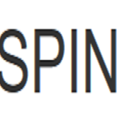We study random constraint satisfaction problems (CSPs) in the unsatisfiable regime. We relate the structure of near-optimal solutions for any Max-CSP to that for an associated spin glass on the hypercube, using the Guerra-Toninelli interpolation from statistical physics. The noise stability polynomial of the CSP's predicate is, up to a constant, the mixture polynomial of the associated spin glass. We prove two main consequences: 1) We relate the maximum fraction of constraints that can be satisfied in a random Max-CSP to the ground state energy density of the corresponding spin glass. Since the latter value can be computed with the Parisi formula, we provide numerical values for some popular CSPs. 2) We prove that a Max-CSP possesses generalized versions of the overlap gap property if and only if the same holds for the corresponding spin glass. We transfer results from Huang et al. [arXiv:2110.07847, 2021] to obstruct algorithms with overlap concentration on a large class of Max-CSPs. This immediately includes local classical and local quantum algorithms.
翻译:在不满意的状态下,我们研究随机约束性满意度问题(CSPs) 。我们把任何最大负负负负负负体的近最佳解决方案结构与超立体上的相关旋转玻璃结构联系起来,使用统计物理学的格拉-托宁内利内,从统计物理学中推断出。CSP上游的噪音稳定性多面性是,直到一个常数,相关旋转玻璃的混合物多面性。我们证明两个主要后果:1)我们把任何随机最大部分的负负载限制与相应旋转玻璃的地面状态能量密度联系起来。由于后一种值可以用Parisi公式计算,我们为一些流行的CSPs提供数字值。2)我们证明,如果并且只有在相应的旋转玻璃保持相同的状态,Max-CSPs具有重叠性属性的通用版本。我们从Huang 等人(arXiv:211.07847,20211)向大量最大类别Max-CSPs重叠的阻碍算法。这立即包括当地古典和地方量算法。


